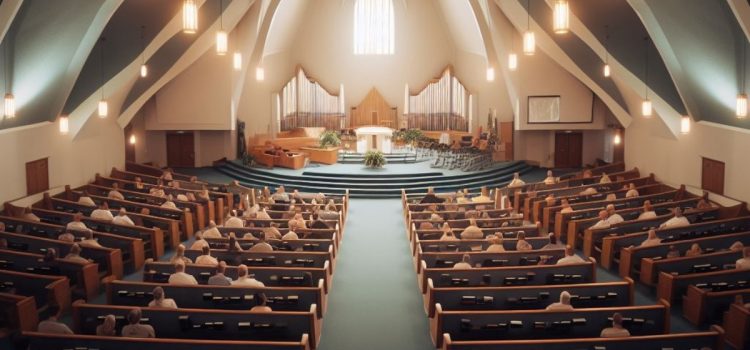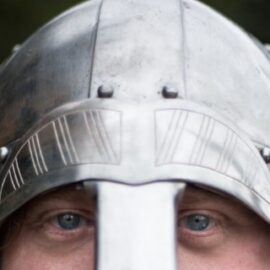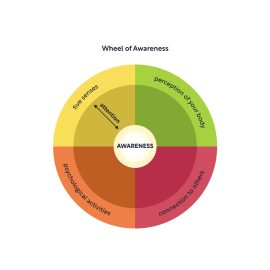

This article is an excerpt from the Shortform book guide to "Jesus and John Wayne" by Kristin Kobes du Mez. Shortform has the world's best summaries and analyses of books you should be reading.
Like this article? Sign up for a free trial here.
How did Teddy Roosevelt help shape American Christianity? What impact did the wars of the 20th century have on the American church?
As a professor of history and gender studies at Calvin University, Kristin Du Mez shares a new perspective on the history of American Christianity. She traces the evolving concept of masculinity within evangelicalism throughout the last century.
Keep reading to get Du Mez’s take on American Christianity in the 20th century.
Christianity in the 20th Century
Du Mez writes that the Victorian model of masculinity began to erode during the late 1890s as the evolving US economy changed the nature of men’s jobs. Rather than working hands-on jobs, men migrated to cities and began working corporate jobs in offices. In turn, for many men who had previously identified their masculinity with their work, this sense of masculinity felt threatened as the new office jobs didn’t require the same manly strength as their previous work.
As a result, Christianity in the 20th century would look quite different. Du Mez says that, under 26th US President Teddy Roosevelt, a new brand of rugged Christian masculinity arose in response to this perceived threat. She notes that Roosevelt’s election in 1901 popularized his conception of masculinity, where men were akin to rough Western cowboys who used violence to protect the innocent. Moreover, she points out that Roosevelt’s rugged conception of masculinity took on a distinctly evangelical flavor through the “muscular Christianity” movement, in which evangelical men rejected pacifism and instead embraced an aggressive view of masculinity that justified violence against one’s enemies in war.
How WWI Undermined Militant Christian Masculinity
Du Mez argues that, while the prospect of WWI stoked the flames of militant masculinity, the war’s reality had the opposite effect: The horrors of WWI cooled the enthusiasm for militant masculinity, causing a shift toward the paradigm of the Christian businessman.
Du Mez explains that, at the end of WWI, Americans recognized the war’s immense cost in bloodshed and carnage with no apparent payoff. Although WWI was billed as the war to end all wars, international conflict and tensions remained high after its conclusion. She points out that, for progressive Protestants in particular—a group that had strongly supported the war before its onset—the destruction wrought by WWI left them disillusioned. Protestant leader Sherwood Eddy, for instance, commented that after WWI, he realized that the alleged goals of the war—to end war for good and make militarism moot—all fell short.
(Shortform note: In American Prometheus, Kai Bird and Martin Sherwin report that much like many Protestants believed WWI would end all war, many military officials hoped that dropping nuclear bombs on Japan during WWII would deter any future wars from occurring. In particular, they point out that physicist J. Robert Oppenheimer, who led the Manhattan Project to design the nuclear bomb, supported bombing Japan for this reason.)
According to Du Mez, the war’s aftermath caused evangelicals to exalt successful business executives as the paradigm of masculinity. For example, she notes that Bruce Barton’s 1925 bestseller, The Man Nobody Knows, portrayed Jesus as the world’s savviest businessman. Further, Barton emphasized Jesus’ strength—understanding strength in a business context, rather than a militaristic context. Evangelical men, according to Barton, should therefore strive to exemplify Jesus’ decisiveness and charisma in business contexts.
(Shortform note: Experts point out that current critics and historians have nearly unanimously denounced Barton’s work, arguing that it reflects the rampant materialism of the early 20th century and provides an inaccurate depiction of Jesus.)
The Renewal of Militant Christian Masculinity in WWII
Although WWI had robbed evangelicals’ hyper-aggressive conception of masculinity of its allure, Du Mez contends that the onset of WWII allowed this conception to rear its head again. She argues that. in the face of Nazi Germany and the Axis powers, evangelical circles once more promoted militant masculinity.
According to Du Mez, Japan’s attack on Pearl Harbor in December 1941—which prompted the US to join WWII the following day—was the watershed moment that shifted evangelical thought about the war. Whereas previously, the memory of WWI had kept evangelicals uncertain about the merits of joining WWII, Pearl Harbor convinced them that the Axis forces in WWII were unequivocally evil and worthy of destruction.
(Shortform note: Evangelicals’ support for US involvement in WWII after Pearl Harbor was reflective of a broader trend among Americans, according to polls. Prior to Pearl Harbor, in 1939, only 16% of Americans supported the US joining the war against Germany, but a few days after Pearl Harbor, 97% of Americans supported joining the war as an allied force.)
Consequently, Du Mez says, the militant evangelical conception of masculinity came into vogue again, as this type of masculinity was deemed necessary to win WWII. In part to promote this masculine ideal, fundamentalist Christians—evangelicals who interpret the Bible as literal truth—created the National Association of Evangelicals (NAE) in 1942. Du Mez relates that the NAE’s cofounder Harold John Ockenga called for evangelical men to go on the offensive, both in the war but also domestically to evangelize the nation.
(Shortform note: Since 1942, the NAE’s influence has only grown: As of 2023, it includes 45,000 local churches as members throughout the US that span 40 Protestant denominations. In addition, it sponsors a wide array of nonprofits, such as World Relief, a resettlement agency that provides humanitarian aid to refugees worldwide.)
The Rise of Billy Graham Leading Into the Cold War
Du Mez argues that the NAE wasn’t the most powerful evangelical force promoting a tough, militaristic masculinity. That title belonged to Billy Graham, an evangelist and minister who started leading evangelical revival movements during WWII. Du Mez writes that Graham employed war and sports metaphors in his portrayals of Jesus to mass audiences—Graham likened Jesus to a “star athlete,” calling him “our great Commander” and emphasizing his immense physical strength. And, by the end of WWII, Graham had established himself as a preeminent defender of “manly evangelicalism.”
According to Du Mez, Graham’s emphasis on militaristic masculinity stretched beyond WWII and into the Cold War—the tension between the US and the communist Soviet Union that began in the late 1940s. She notes that, in Graham’s rallies, he portrayed communism as an evil force driven by Satan that threatened to annihilate the world via nuclear weapons. In turn, Graham exhorted evangelical men to protect their nation by fighting the Soviets in battle if necessary but also by maintaining righteous homes to defeat the moral evils of communism.
Evangelical Masculinity During the 1960s and 1970s
While the threat of communism during the Cold War sustained evangelicals’ militant masculinity in the wake of WWII, Du Mez explains that additional international and domestic threats strengthened this conception of masculinity throughout the 1960s and ’70s. We’ll first examine how the US military’s failure in the Vietnam War caused evangelicals to adopt a more hostile view of masculinity, then discuss how the perceived threat of feminism led evangelicals to double down on traditional gender roles in the home.
The Impact of the Vietnam War
According to Du Mez, US participation in the Vietnam War—in which the US faced guerrilla warfare from the communist Viet Cong, which controlled Northern Vietnam—further entrenched the militant evangelical conception of masculinity.
First, Du Mez argues, that during the Vietnam War, evangelicals made excuses for atrocities perpetrated by US soldiers. For example, Lieutenant William Calley was found guilty of murdering 22 innocent Vietnamese civilians during the My Lai massacre—an episode in which US soldiers murdered around 500 Vietnamese villagers during the war. However, Du Mez notes that Billy Graham, for example, downplayed these atrocities. Graham commented that the Viet Cong had likely also committed war crimes, and even noted in The New York Times that “We have all had our Mylais in one way or another, perhaps not with guns, but we have hurt others with a thoughtless word, an arrogant act or a selfish deed.”
(Shortform note: Despite the fact that the Charlie Company of the 11th Brigade massacred hundreds of civilians, only Calley was convicted of murder. According to experts, this was because of insufficient photographic evidence—photographs clearly showed Calley committing war crimes, but no photographs showed exactly which additional members of the Charlie Company murdered civilians. For this reason, prosecutors couldn’t prove the guilt of any additional soldiers beyond a reasonable doubt.)
Further, Du Mez observes that as the Vietnam War dragged on and the US failed to defeat the Viet Cong, many Americans grew disillusioned with US involvement in the war. Evangelicals, by contrast, drew a different conclusion, arguing that the US’s inability to defeat the Vietnamese stemmed from a dearth of masculinity among US soldiers. Du Mez reports that, to remedy this problem, evangelicals maintained that fathers needed to raise their sons to become rugged defenders of freedom—for instance, fundamentalist pastor Jack Hyles exhorted evangelicals to raise boys who weren’t afraid to use violence to defend their families.
(Shortform note: Contrary to the evangelical view that a masculinity crisis was behind the US’s inability to defeat the Viet Cong, experts maintain that a wide array of factors led to the US’s military struggles. For instance, the Viet Cong relied on guerrilla warfare—a style of fighting that prioritized quick ambushes and hit-and-runs rather than full-fledged battles—against which the US struggled to defend because of the unfamiliar jungle terrain. Additionally, the US’s mistreatment of civilians turned the Vietnamese people against its military, causing the US to lose cooperation from civilians.)
The Pushback Against the Feminist Movement
In addition to the upheaval caused by the Vietnam War, Du Mez points out that further social unrest in the ’70s stemmed from the feminist movement, which attempted to undermine traditional gender norms that confined women to the domestic sphere. She argues that, as a reaction to this movement, two sets of influential evangelicals—Marabel Morgan and Phyllis Schlafly on one hand, and Bill Gothard and James Dobson on the other—pushed back against feminism by defending traditional gender norms in marriage and in the nuclear family.
Du Mez writes that, in the ’70s, Morgan and Schlafly published influential anti-feminist books that spurred anti-feminist activism from evangelicals. For her part, Morgan argued that women ought to submit to their husbands to achieve domestic happiness because that was God’s intention for marriage (a belief known as complementarian theology). Moreover, because women ought to submit, Morgan concluded that men were required to become leaders in the domestic sphere. In a similar vein, Schlafly opposed the Equal Rights Amendment (ERA), a proposed amendment to the US Constitution that prohibited denial of equal rights on the basis of sex, arguing that the amendment falsely presupposed that women were oppressed and thus needed protection.
(Shortform note: Since the ’70s, influential evangelical women have arguably taken a more charitable approach toward feminism. For example, prominent evangelical author Beth Moore—though not a feminist per se—has publicly disavowed the gender roles of complementarian theology, instead opting for an egalitarian approach. In so doing, she’s aligned her views with those of feminists who agree that strict gender-based roles in marriage and work are inherently harmful.)
While Morgan and Schlafly focused largely on evangelical women, Gothard and Dobson instead geared their advice toward evangelical men, arguing that men should rule the family with an iron fist. Du Mez relates that Gothard hosted seminars with over 200,000 evangelical attendees during the 1970s, teaching that societal problems stemmed from noncompliance with authority—problems that could be solved in the domestic sphere through unflinching obedience to fathers in the home. Likewise, Dobson—who founded Focus on the Family, an evangelical organization that sought to promote traditional family structures of male breadwinners and female housewives—emphasized the father’s responsibility to discipline his children with corporal punishment (that is, spanking).
(Shortform note: Although evangelicals like Gothard and Dobson endorsed corporal punishment as a means to disciplining one’s children, a wealth of research has shown that corporal punishment has detrimental effects later on in children’s lives. For example, one meta-analysis of studies found that corporal punishment of children was associated with significantly higher antisocial behavior as an adult, including increased violence, aggression, and various mental health issues.)
Evangelical Masculinity During the 1980s and 1990s
While opposition to the feminist movement helped spur on evangelical political engagement in the 1970s, Du Mez maintains that evangelicals became especially involved politically throughout the ’80s and ’90s. We’ll first look at the 1980 presidential election between Ronald Reagan and Jimmy Carter, which Du Mez claims was pivotal to the formation of the religious right, then examine how the lack of a concrete military opponent in the 1990s temporarily caused evangelicals to embrace a gentler masculinity devoid of its previous aggression.
The Reagan vs. Carter Election
Du Mez contends that a watershed moment for evangelical identity in the US occurred in the 1980 presidential election, which pitted Republican Ronald Reagan against incumbent Democrat Jimmy Carter. She argues that Reagan’s victory over Carter cemented the marriage between evangelicals and the political right: Even though Carter personally identified as an evangelical Christian—whereas Reagan was an infrequent churchgoer at best—evangelical voters embraced Reagan’s socially conservative policies and ruggedly masculine image.
Du Mez explains that Reagan intentionally built social capital with evangelical voters. For instance, while Reagan had previously supported the ERA as governor of California, he walked back his support while campaigning for president. Similarly, he began embracing evangelical policy points, such as supporting prayer in public schools and prohibiting abortion.
However, Du Mez suggests that what ultimately sealed the deal for Reagan with evangelical voters was his perceived masculinity. Whereas Jimmy Carter was often deemed a “wimp” by critics, Reagan seemed reminiscent of a cowboy, even owning his own ranch in California. Moreover, Du Mez writes that Reagan reinforced this masculine appearance by becoming the “tough on crime” candidate who wasn’t afraid to ruthlessly punish criminals, even using violence when needed.
Consequently, Du Mez says, when the 1980 election came to pass, Reagan won the white evangelical vote in a landslide: 67% of white evangelicals voted for Reagan, even though 50% had voted for Carter in the previous election. Du Mez relates that, since that 1976 election, no Democrat has even come close to winning the majority of the evangelical vote.
The Formation of the Religious Right
Although Reagan’s election cemented the marriage between evangelicals and the right, Du Mez clarifies that two key parties laid the foundation for this religious right during the 1980s: The LaHaye family and Jerry Falwell Sr.
She notes that the LaHaye family includes Tim and Beverly LaHaye, each of whom played a role in strengthening the religious right. For his part, Tim LaHaye was a pastor whose books in the early 1980s stoked a sense of embattlement on behalf of evangelicals. He argued that progressives were undermining key aspects of evangelical life, such as education and the family, meaning evangelicals needed to align themselves with the right. Beverly LaHaye founded Concerned Women for America (CWA), an influential evangelical organization that targeted the progressive feminist agenda throughout the 1980s.
Similar to the LaHayes, Falwell Sr. was essential to bringing the religious right into the political mainstream. As Du Mez relates, he created the Moral Majority in 1979, an organization that sought to mobilize the religious right in elections throughout the 1980s. In particular, Falwell Sr. promoted a militaristic approach and advocated that America maintain a dominant military to fend off domestic and international threats, largely from Marxists who, according to Falwell, wished to undermine the evangelical family unit.
The Evangelical Shift Toward “Soft Patriarchy”
Du Mez points out that, despite Falwell Sr.’s emphasis on militant masculinity, the US’s lack of a concrete military opponent throughout the 1990s caused this conception of masculinity to atrophy. Instead, evangelicals promoted a less virulent but nonetheless patriarchal view of masculinity according to which men were divinely ordained to lead in the home as servant-hearted leaders—people who lead first and foremost through serving.
According to Du Mez, this shift originated in evangelical theologians John Piper and Wayne Grudem’s 1991 book, Recovering Biblical Manhood and Womanhood. Piper and Grudem defended complementarianism, the view that God considered men and women to be moral equals but assigned them different roles. In particular, they contend that leadership in the house and the church was reserved for men. However, they also argued that men should lead with humility and love, unlike the militant, domineering leadership that Falwell Sr. preferred.
While abstract, Piper and Grudem’s ideas had concrete consequences via the Promise Keepers, an evangelical organization in the late 1990s. Du Mez writes that Promise Keepers promoted complementarian ideas of “soft patriarchy” by exhorting evangelical men to become gentle leaders. Promise Keepers members often vowed to become better husbands and fathers by forsaking sinful activities like drinking and adultery and being present in their children’s lives. According to Du Mez, Promise Keepers undermined the militaristic view of masculinity that evangelicals had previously espoused, while retaining its patriarchal bent.

———End of Preview———
Like what you just read? Read the rest of the world's best book summary and analysis of Kristin Kobes du Mez's "Jesus and John Wayne" at Shortform.
Here's what you'll find in our full Jesus and John Wayne summary:
- The real reason why Donald Trump won the 2016 presidential election
- An analysis of the four historical eras of evangelical masculinity
- The effect that the first and second World Wars had on evangelicals






